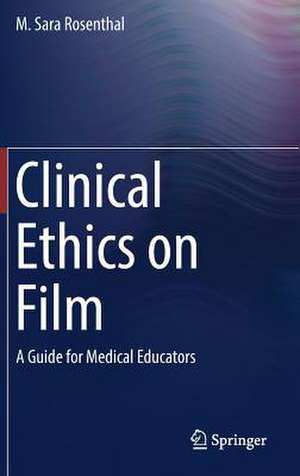Clinical Ethics on Film: A Guide for Medical Educators
Autor M. Sara Rosenthalen Limba Engleză Hardback – 20 aug 2018
| Toate formatele și edițiile | Preț | Express |
|---|---|---|
| Paperback (1) | 384.86 lei 6-8 săpt. | |
| Springer International Publishing – 26 ian 2019 | 384.86 lei 6-8 săpt. | |
| Hardback (1) | 491.82 lei 6-8 săpt. | |
| Springer International Publishing – 20 aug 2018 | 491.82 lei 6-8 săpt. |
Preț: 491.82 lei
Nou
Puncte Express: 738
Preț estimativ în valută:
94.11€ • 98.27$ • 77.71£
94.11€ • 98.27$ • 77.71£
Carte tipărită la comandă
Livrare economică 15-29 aprilie
Preluare comenzi: 021 569.72.76
Specificații
ISBN-13: 9783319903736
ISBN-10: 331990373X
Pagini: 344
Ilustrații: XXI, 215 p.
Dimensiuni: 155 x 235 x 15 mm
Greutate: 0.51 kg
Ediția:1st ed. 2018
Editura: Springer International Publishing
Colecția Springer
Locul publicării:Cham, Switzerland
ISBN-10: 331990373X
Pagini: 344
Ilustrații: XXI, 215 p.
Dimensiuni: 155 x 235 x 15 mm
Greutate: 0.51 kg
Ediția:1st ed. 2018
Editura: Springer International Publishing
Colecția Springer
Locul publicării:Cham, Switzerland
Cuprins
Part 1: END OF LIFE ON FILM.- Chapter 1: If I Was Restricted to One Film: Wit (2001).- Chapter 2: It’s Really About Cruzan and Quinlan: Whose Life is It, Anyway? (1981) .- Chapter 3: Closure and Family Systems: My Life (1993).- Chapter 4: “Bye, Bye, Life”: All That Jazz (1979).- Part 2: FILMS ABOUT COMPETENCY AND DECISION-MAKING CAPACITY.- Chapter 5: One Eye and an Alphabet: Diving Bell and the Butterfly (2007) .- Chapter 6: The Successful Delusional: K-PAX (2001).- Chapter 7: Malingering and Nursing Ethics: One Flew Over the Cuckoo’s Nest (1975).- Chapter 8: Dementia and Capacity: Still Alice (2014).- Part 3: FILMS ABOUT BENEFICENCE .- Chapter 9: “Am I Good Man, or a Bad Man?” The Elephant Man (1980) .- Chapter 10: Pediatric Ethics and the Limits of Parental Authority: Lorenzo’s Oil (1992).- Chapter 11: Weighing Clinical Goods over Clinical Harms: Awakenings (1990).- Chapter 12: “She Threw Up in her Mask”: The Verdict (1982).- Chapter 13: “How Many Dead Hemophiliacs Do You Need?” And The Band Played On (1993).- Chapter 14: The Tuskegee Syphilis Study: Miss Evers’ Boys (1997).- Chapter 15: Physician-Assisted Suicide: You Don’t Know Jack (2010). .- Part 5: ORGANIZATIONAL ETHICS AND RESOURCE ALLOCATION.- Chapter 16: The U.S. Healthcare System: Sicko (2007).- Chapter 17: We Heal No One; We Do Nothing: The Hospital (1971).- Chapter 18: Some Good Parts: The Transplant Films.- PART 6: PROFESSIONALISM AND HUMANISM.- Chapter 19: A Classic for a Reason: The Doctor (1991) .- Chapter 20: A Home Healthcare Gem: Passion Fish (1992).- Chapter 21: A Tale of Two Colleagues and Pediatric Surgery: Something the Lord Made (2004).
Notă biografică
Dr. M. Sara Rosenthal is Professor of Bioethics, Departments of Internal Medicine, Pediatrics, and Behavioral Science at the University of Kentucky. She is Founding Director of the University of Kentucky Program for Bioethics, Chair of the University of Kentucky Healthcare Ethics Committee, and Director of the University of Kentucky’s Clinical Ethics Consultation Service. She received all her training at the University of Toronto, including her graduate training in medical sociology and bioethics training at the University of Toronto Joint Centre for Bioethics. She has an undergraduate degree in English literature (minor in film studies), as well as a Bachelor of Education (Canada) and Teaching Certificate in English Literature and Politics. Prior to her bioethics career, she was a medical journalist for many years, and has a well-recognized name in health trade publishing, having written over 30 trade books. As an academician, Dr. Rosenthal has published numerous peer-reviewed papers, and has served as bioethicist on several clinical practice guidelines committees; she has also chaired ethics committees for national medical professional societies. As a bioethicist, medical sociologist, and film buff, she has been using film to teach clinical ethics for over 15 years, and teaches a popular cross-over course at the University of Kentucky called “Bioethics on Film” which has two sections: one for healthcare trainees and medical students, and one for undergraduate students. She has created two multimedia series for medical residency education: Introduction to Clinical Ethics (2007) and Professionalism and Humanism (2010), which are designed as documentaries that use over 100 film clips to demonstrate clinical ethics and professional ethics issues. She has also created an original self-guided documentary on Moral Distress, known as The Moral Distress Education Project, which contains several hours of original interviews with experts on moral distress.
Textul de pe ultima copertă
This book discusses feature films that enrich our understanding of doctor-patient dilemmas. The book comprises general clinical ethics themes and principles and is written in accessible language. Each theme is discussed and illuminated in chapters devoted to a particular film. Chapters start with a discussion of the film itself, which shares details behind the making of the film; box-office and critical reception; casting; and other facts about production. The chapter then situates the film in a history of medicine and medical sociology context before it delves into the clinical ethics issues in the film, and how to use it as a teaching aid for clinical ethics. Readers will understand how each film in this collection served to bring particular clinical ethics issues to the public’s attention or reflected medico-legal issues that were part of the public discourse. The book is a perfect instructor's guide for anyone teaching bioethics, healthcare ethics, medical sociology, medical history, healthcare systems, narrative medicine, or nursing ethics.
Caracteristici
Informs teachers, healthcare professionals and patients about films that are useful to explain healthcare issues and dilemmas and/or to validate their experiences Serves as a course book for a myriad of areas, including: bioethics, health law, medicine, nursing, pharmacy, health sciences, film, and sociology Authored by a seasoned writer and clinical ethics expert with over 100 publications, including over 30 well-known health books for the trade market.
